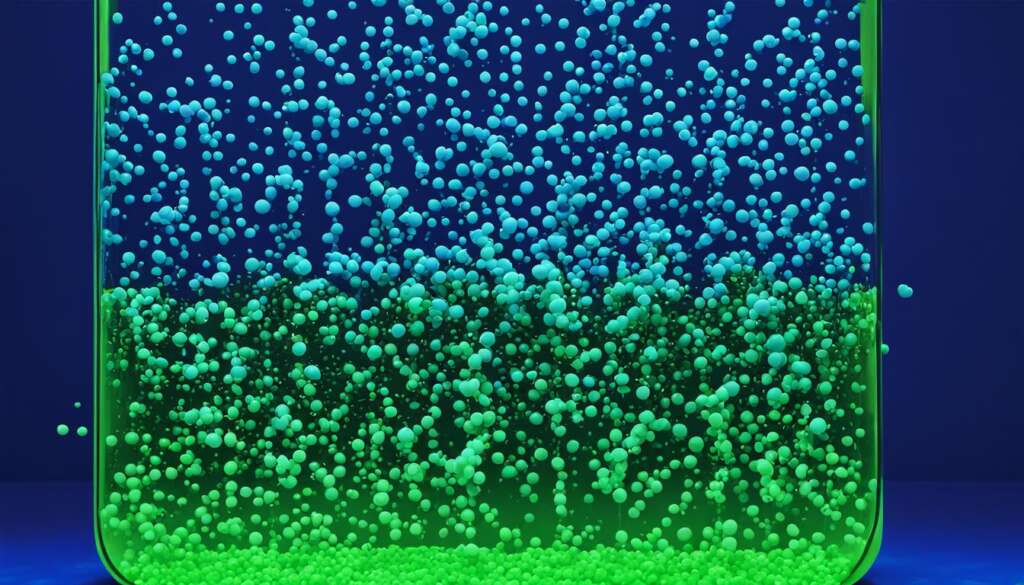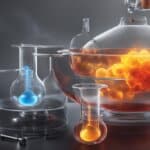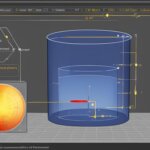Table of Contents
In chemistry, gas refers to a state of matter consisting of individual molecules that have high kinetic energy and are widely separated, occupying the entire space of their container. Gas is an essential concept in chemistry that plays a significant role in chemical reactions, the atmosphere, and industry.
Understanding gas in chemistry is fundamental to comprehending many chemical processes. The unique properties of gas make it behave differently from other states of matter such as solids and liquids. In this section, we will explore the basics of gas in chemistry, including its properties, behavior, and what constitutes gas in the context of chemistry.
Key Takeaways
- Gas is a state of matter that consists of widely separated molecules and high kinetic energy.
- Understanding gas in chemistry is essential to comprehend many chemical processes.
- The properties of gas, such as pressure, volume, and temperature, are different from other states of matter.
- Gas plays a significant role in chemical reactions, the atmosphere, and industry.
- Gas in chemistry represents one of the fundamental concepts in the field of chemistry.
Properties of Gas in Chemistry
Gas in chemistry has unique properties that allow it to behave differently from other states of matter. To better understand gas behavior, it is essential to explore its properties:
- Pressure: Gas molecules are in constant motion and collide with one another and the walls of the container they are in. This collision creates pressure, which is measured in units of force per unit area, such as pascals or atmospheres.
- Volume: Unlike solids and liquids, gas does not have a fixed shape or volume. It takes on the shape and volume of its container.
- Temperature: The temperature of gas affects its properties and behavior, as it relates to the average kinetic energy of the molecules. When temperature increases, the kinetic energy and speed of the molecules also increase.
- Ideal Gas Law: The relationship between pressure, volume and temperature of an ideal gas is described by the ideal gas law – PV = nRT. Where P is pressure, V is volume, n is the number of particles, R is the gas constant and T is temperature in Kelvin.
In summary, these properties of gas impact how it behaves in various reactions and interactions with other substances.
Gas Behavior in Reactions
Gases exhibit unique behaviors when participating in chemical reactions, and understanding these behaviors is crucial for predicting reaction outcomes.
In combustion reactions, for example, gases like oxygen and hydrogen undergo rapid reactions with other elements or compounds, releasing heat and energy as a result. Synthesis reactions involving gas typically produce a larger, more complex molecule from smaller components held together by chemical bonds. Conversely, decomposition reactions involving gas break down a larger molecule into smaller ones by breaking these chemical bonds.
It’s also important to consider the volume and pressure of gases in chemical reactions. Gas volumes are typically expressed in units of litres or millilitres, whereas pressure is measured in pascals or atmospheres.
“The behavior of gas in reactions is not always straightforward and can be highly dependent on the specific elements and conditions involved. However, understanding these factors is vital for predicting and controlling chemical processes.”
A notable example of this is the ideal gas law, which describes the behavior of gas in relation to its pressure, volume, and temperature. This law indicates that the pressure of a gas is proportional to its absolute temperature when its volume remains constant. The impact of gases in chemical reactions is paramount and can often be the deciding factor in the success or failure of a reaction.
Summary
The behavior of gases in chemical reactions is complex and multifaceted, with a range of unique properties and characteristics that must be taken into account during analysis and prediction. From combustion and synthesis to decomposition reactions, each offers fascinating insights into the behavior of gas in reaction scenarios.
Conclusion
Gas in chemistry is a fundamental concept that plays a crucial role in various chemical reactions. Understanding its properties and behavior is essential for predicting and analyzing the outcomes of these processes.
From this article, we have gained a clear understanding of the unique properties of gas, including pressure, volume, temperature, and the ideal gas law. We have also explored how gas behaves in various chemical reactions, including combustion, synthesis, and decomposition reactions.
In summary, the study of gas in chemistry is vital for the advancement of the field. By comprehending its behavior and properties, we can better predict and control the outcomes of chemical reactions.
Thank you for reading this article on gas in chemistry. We hope that the information presented has provided you with a better understanding of this fundamental concept.
FAQ
What is gas in chemistry?
Gas in chemistry refers to a state of matter characterized by low density and high compressibility. It consists of individual particles that move freely and rapidly. Gases do not have a definite shape or volume and can expand to fill the container they are in.
What are the properties of gas in chemistry?
Gas in chemistry exhibits several properties, including pressure, volume, temperature, and the ideal gas law. Pressure refers to the force exerted by gas particles on the walls of the container. Volume is the amount of space occupied by the gas. Temperature affects the motion and energy of gas particles. The ideal gas law, PV = nRT, relates these properties, where P is pressure, V is volume, n is the number of moles, R is the ideal gas constant, and T is the temperature in Kelvin.
How does gas behave in chemical reactions?
Gas can exhibit various behaviors in chemical reactions. For example, in combustion reactions, a gas reacts with oxygen to produce heat and light. In synthesis reactions, gases combine to form a new compound. In decomposition reactions, gases break down into simpler substances. Different gases have distinct behaviors and participate in specific reactions based on their properties.
Why is understanding gas in chemistry important?
Understanding gas in chemistry is vital because it provides insights into how gases behave and interact with other substances. Gas plays a crucial role in numerous chemical reactions and industrial processes. By comprehending the properties and behavior of gas, scientists and chemists can predict and control the outcomes of chemical reactions, optimize conditions for industrial applications, and design safer systems for handling and storing gases.













